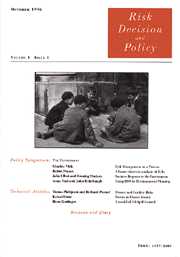Crossref Citations
This article has been cited by the following publications. This list is generated based on data provided by
Crossref.
Patt, Anthony
and
Gwata, Chiedza
2002.
Effective seasonal climate forecast applications: examining constraints for subsistence farmers in Zimbabwe.
Global Environmental Change,
Vol. 12,
Issue. 3,
p.
185.
Ziervogel, Gina
and
Calder, Rebecca
2003.
Climate variability and rural livelihoods: assessing the impact of seasonal climate forecasts in Lesotho.
Area,
Vol. 35,
Issue. 4,
p.
403.
Patt, Anthony
and
Dessai, Suraje
2004.
Communicating uncertainty: lessons learned and suggestions for climate change assessment
.
Comptes Rendus. Géoscience,
Vol. 337,
Issue. 4,
p.
425.
Legesse, Belaineh
and
Drake, Lars
2005.
Determinants of smallholder farmers' perceptions of risk in the Eastern Highlands of Ethiopia.
Journal of Risk Research,
Vol. 8,
Issue. 5,
p.
383.
Schröter, Dagmar
Polsky, Colin
and
Patt, Anthony G.
2005.
Assessing vulnerabilities to the effects of global change: an eight step approach.
Mitigation and Adaptation Strategies for Global Change,
Vol. 10,
Issue. 4,
p.
573.
Patt, Anthony
Suarez, Pablo
and
Gwata, Chiedza
2005.
Effects of seasonal climate forecasts and participatory workshops among subsistence farmers in Zimbabwe.
Proceedings of the National Academy of Sciences,
Vol. 102,
Issue. 35,
p.
12623.
Grothmann, Torsten
and
Patt, Anthony
2005.
Adaptive capacity and human cognition: The process of individual adaptation to climate change.
Global Environmental Change,
Vol. 15,
Issue. 3,
p.
199.
Ziervogel, Gina
Bithell, Mike
Washington, Richard
and
Downing, Tom
2005.
Agent-based social simulation: a method for assessing the impact of seasonal climate forecast applications among smallholder farmers.
Agricultural Systems,
Vol. 83,
Issue. 1,
p.
1.
Cash, David W.
Borck, Jonathan C.
and
Patt, Anthony G.
2006.
Countering the Loading-Dock Approach to Linking Science and Decision Making.
Science, Technology, & Human Values,
Vol. 31,
Issue. 4,
p.
465.
Patt, Anthony G.
Bowles, Hannah R.
and
Cash, David W.
2006.
Mechanisms for enhancing the credibility of an adviser: prepayment and aligned incentives.
Journal of Behavioral Decision Making,
Vol. 19,
Issue. 4,
p.
347.
Patt, Anthony G.
Bowles, Hannah Riley
and
Cash, David
2006.
Mechanisms for Enhancing the Credibility of an Adviser: Prepayment and Aligned Incentives.
SSRN Electronic Journal,
Sivakumar, M. V. K.
and
Hansen, J.
2007.
Climate Prediction and Agriculture.
p.
1.
Power, S. B.
Plummer, N.
and
Alford, P.
2007.
Making climate model forecasts more useful.
Australian Journal of Agricultural Research,
Vol. 58,
Issue. 10,
p.
945.
Morss, Rebecca E.
Demuth, Julie L.
and
Lazo, Jeffrey K.
2008.
Communicating Uncertainty in Weather Forecasts: A Survey of the U.S. Public.
Weather and Forecasting,
Vol. 23,
Issue. 5,
p.
974.
Feldman, David L.
and
Ingram, Helen M.
2009.
Making Science Useful to Decision Makers: Climate Forecasts, Water Management, and Knowledge Networks.
Weather, Climate, and Society,
Vol. 1,
Issue. 1,
p.
9.
Prabhakar, S. V. R. K.
Srinivasan, Ancha
and
Shaw, Rajib
2009.
Climate change and local level disaster risk reduction planning: need, opportunities and challenges.
Mitigation and Adaptation Strategies for Global Change,
Vol. 14,
Issue. 1,
p.
7.
Roncoli, Carla
Jost, Christine
Kirshen, Paul
Sanon, Moussa
Ingram, Keith T.
Woodin, Mark
Somé, Léopold
Ouattara, Frédéric
Sanfo, Bienvenue J.
Sia, Ciriaque
Yaka, Pascal
and
Hoogenboom, Gerrit
2009.
From accessing to assessing forecasts: an end-to-end study of participatory climate forecast dissemination in Burkina Faso (West Africa).
Climatic Change,
Vol. 92,
Issue. 3-4,
p.
433.
Nadav-Greenberg, Limor
and
Joslyn, Susan L.
2009.
Uncertainty Forecasts Improve Decision Making Among Nonexperts.
Journal of Cognitive Engineering and Decision Making,
Vol. 3,
Issue. 3,
p.
209.
Patt, Anthony
2009.
Uncertainties in Environmental Modelling and Consequences for Policy Making.
p.
231.
KAMANGA, B. C. G.
WADDINGTON, S. R.
ROBERTSON, M. J.
and
GILLER, K. E.
2010.
RISK ANALYSIS OF MAIZE-LEGUME CROP COMBINATIONS WITH SMALLHOLDER FARMERS VARYING IN RESOURCE ENDOWMENT IN CENTRAL MALAWI.
Experimental Agriculture,
Vol. 46,
Issue. 1,
p.
1.




